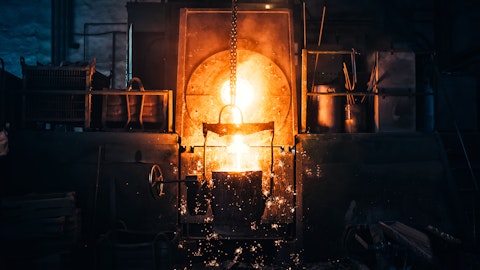He’s built a team around him, they got their head around it. We are highly skilled and highly competent across that team. We brought in people across industries from refining all the way into wet milling all the way into dry milling, and built a really new team as we had turned that team over. And they had kind of hit it hard and set us up so that during that time at least we were able to quickly mobilize, take advantage and get through some of the things we would have done in the last half at our normal shutdowns fall shutdowns. And we’re not going to have to do some of those now, which is going to be helpful. So it was just a bit of a perfect storm that hit us. Unfortunately, we had ourselves set up for a pretty good quarter. And then between Wood River, the spiral effect of locking things in and then having unplanned downtimes just hit us hard and we’ll move on from that and just run full out as best we can during the last half and show everybody what this is capable of, because we could have shown it in the second quarter and it just was not able to execute because of those couple of reasons.
Salvator Tiano: Perfect. And as a follow up, you mentioned you were in the final stage of negotiations for the 60 Pro volumes in Q4. I personally at least was under the impression things were more firm in terms of sales there. So is there any risk that negotiations may not yield the outcome that you would like and you may actually not sell 60 Pro volumes here, and it’s been a while since we announced obviously the fish mill partnership with Riverence. So how are things progressing there as well?
Todd Becker: Yes, so I don’t think we gave anybody a certainty of sale, but what we did say is we’re negotiating in the fourth quarter. We feel like now we’re in such late stages that we’re even negotiating destinations, price, all those type of things. So we know we’ll make it into some rations into the fourth quarter. And that’s why we’re now starting to ramp up. It’ll take us a good 30 days to get into full production rate, even though we can start to hit it within a few days. But just to get consistent and make sure that the plants lined out running well. But that’s why our confidence has gone up. Relative to starting up one of our 60 Pro plants, even earlier than probably we thought we were going to do, our Riverence partnership remains strong.
We are already in one of their rations through one of their third-party suppliers. We know that for a fact, we’re working on getting into another ration of theirs. We know that our product is very valuable. Our partnership is remains strong. We’re looking at kind of their volume going forward and what we can do together and where we should really place our asset. It’s a long game when you think about the feeding cycles for what they do and what the other salmon producers do around the world, this is a two year cycle almost from the time you start till the time you harvest an end product. And so we have plenty of time, but the partnership remains strong. The asset base is starting to be thought of, there is an asset in the middle of that already.
And we hopefully will start to see the benefit, the full benefit of that partnership over the next kind of year or two. But it’s a long game when you think about the feeding cycle of these companies and the growth cycle of these companies, and not many better than Riverence in the world. And I can only assure you that our partnership is strong in place and looking for where we’re going to continue to expand it.
Salvator Tiano: Thank you very much.
Operator: Next question comes from Laurence Alexander, Jefferies. Please go ahead.
Dan Rizzo: Hi, this is Dan Rizzo on for Laurence. Just a quick question, are there any lingering costs associated with the combination with GPP that’s going to occur later in the next couple months?
Jim Stark: Yes, I would say there’s – depending on where we get to in the transaction, there’s still absolute merger costs that could happen. We need shareholder votes, we need, there’s lawyers, there’s several things in terms of filing. So I mean, I would say, there’s deal fees, all those type of things have to happen. And but overall, we could break those out and if they’re all one-timers, but I think the overall benefit of bringing them in would greatly exceed that if we can get this deal done.
Dan Rizzo: And I’m sorry if I forgot this, but have you quantified what the synergies are with doing this? The cost of the cost savings are?



